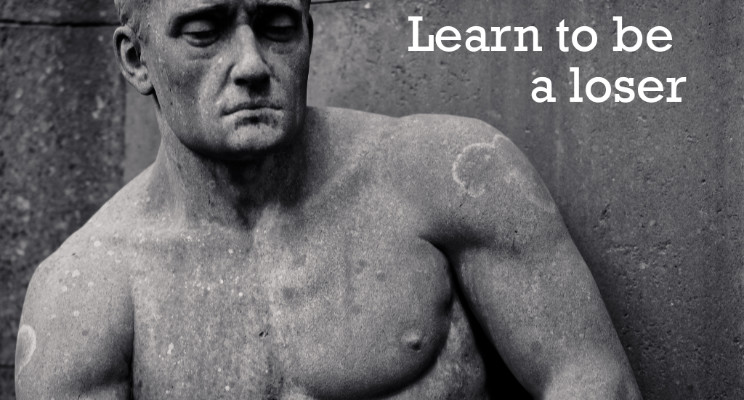Learn to be a loser
I heard something fall.
It could have been from me, but I had no time to think. I was about to miss my train.
I saw train’s doors were shutting. Still running, I leap between the gap, squeezing in just in time. “Yes”, I thought.
Plonked on a seat by the window, still panting and out of breath, it dawned on me. That sound! My Ray-Bans. Ahhh!
How stupid. What a dumb thing to do. It’s sort of funny I guess, but I was pissed off. Those sunglasses weren’t cheap. Why did I hang it on my unbuttoned shirt? What was I thinking?
I felt like shit.
It was my fault. I forgot they were there and I never thought much about them when I bought them, even with their premium price tag.
I’m such a loser.

There is this theory in economics called utility. It’s this idea that we mentally apply a unit of utility – or a unit of pleasure – on everything we consume. It is supposed to diminish the more we consume. And, it can be negative when we experience displeasure.
It isn’t difficult to understand. If you’ve ever eaten an Easter egg, like many of us have recently, you’ll get it. That first bite tastes divine, but towards the end, it’s quite sickly and sweet. If you continue, you I would eventually feel sick and suffer negative utility. My kids of course would probably disagree, but it’s a reality I’ve learnt to accept – to much of a good thing is bad for you – even Swiss chocolate.

However, you can’t apply this to everything. There are times when units of pleasure don’t really marginally decrease over time. Often they barely increase. Then you just lose and it really hurts.
This is what I experienced with the loss of my Ray-Bans. I don’t recall the positive units of utility I enjoyed when I had them. There was some excitement when I first got them, but this diminished very quickly.
Personally, like most people, I don’t mentally calculate units of utility when I win and lose – I just get emotional.
This is a very human reaction. We’re not robots after all. There’s this experiment that demonstrates this behaviour. It has been repeated so many times in behavioural finance that it’s an absolute classic.
There are two sets of people.
Set One: You’ve lost $50, but can take a risk and lose nothing.
This set of people have the choice of a $50 loss or spinning the wheel. If they spin the wheel, there is a 50:50 chance they will either lose $100 or lose nothing at all. Most in this group typically take the risk and spin the wheel, hoping they will lose nothing. They become risk lovers.
Set Two: You’ve won $50, but can take a risk and double your money.
This set of people have just won $50. They can either take the money now or spin the wheel. If they win they double their winnings, taking $100. But if they lose, they get nothing at all. This time around, most people take the $50 and pass on spinning the wheel. They become risk averse.

This is not really very difficult to understand. Winning is great, but losing really sucks. Losing is much more painful and the risk of feeling this emotion affects the decisions we make in a way that doesn’t seem logical.
What I did was completely stupid.
I valued the loss of missing a train more than my expensive sunglasses, which I forgot about and took a risk. It would have been better if I just missed the train. I would have felt bad, but not as bad as I did that day.
What’s interesting though is that I failed to mentally predict that I could lose my sunglasses at all. Perhaps if I did, then the decisions I would have made would have been different.
The point here is that I’m not very good at mentally calculating risk. No one is. It’s human nature. In this consumption-led information age, evolution hasn’t been quick enough to allow humans to think like this.
Now just imagine what happens when people invest and are faced with winning and losing their life savings. It’s frustrating watch, especially when they panic in a down market. When this happens, their investment strategies and goals go out the window.
The best advice is to be patient, but it’s not that easy. I personally found this difficult to follow.
In the end, I learnt that you need to conquer your emotions. Success can only come when you learn to lose.









